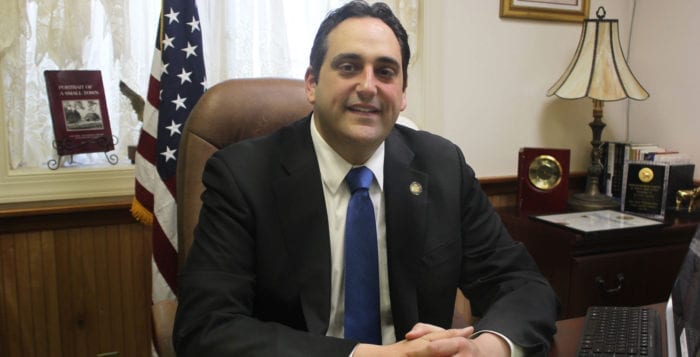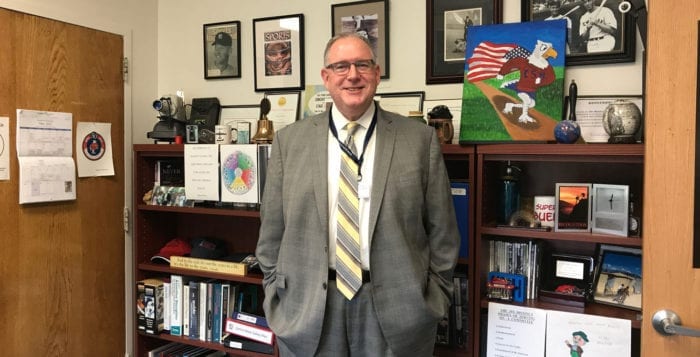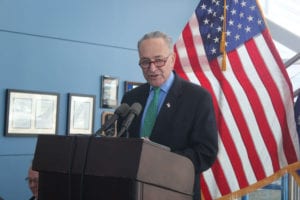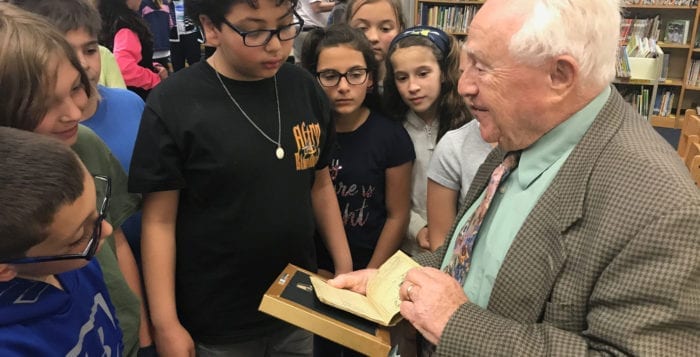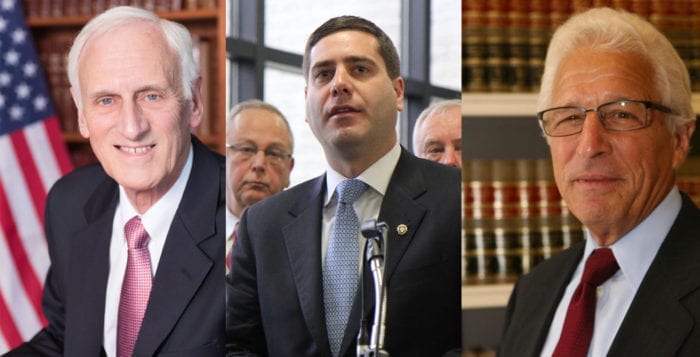New York State Assemblyman Chad Lupinacci (R-Huntington Station), chosen May 30 as the Huntington Republican Committee’s candidate for town supervisor, had just 24 hours to decide if he wanted to commit to a bid for the coveted position, most recently held for two decades by Frank Petrone (D).
Lupinacci, 38, was approached by committee Chairwoman Toni Tepe to fill the party’s vacant candidate seat after Town Councilman Gene Cook (I), who announced his bid for the position May 21 and was on track to secure both Republican and Conservative support, suddenly dropped out.
But for the lifelong Huntington resident, business law and political science professor at Farmingdale State College and Hofstra University, respectively, and state lawmaker, currently serving his third term for the 10th district, it was an easy choice.
“When you’re in a position for a period of time you sometimes lose sight of what’s going on and what’s in tune with the people,” Lupinacci said, referring to Petrone’s 24 years as supervisor and the town’s need for new direction. “You become part of the system rather than actually being able to shake things up… I think I’ll be able to look at the job from a different vantage point, as someone with a different skill set and legislative accomplishments that we can bring home to Huntington.”
As an assemblyman, elected in 2012, Lupinacci serves as the ranking Republican member on the Assembly Committee on Higher Education, and sits on the Judiciary, Election Law, Transportation and Park and Tourism committees. For nine years, starting in 2004, he was a trustee on the South Huntington school board.
“He’s a stand up guy,” Andre Sorrentino, chief of the Huntington Fire Department and Lupinacci’s friend for more than 20 years, said. “He’s just one of those guys you can trust, he’s a great leader, and he understands that our first responders and police department mean a lot. He’s a very good man.”
The assemblyman will be facing off against Councilwoman Tracey Edwards (D) who announced her campaign last month. Sorrentino said he supports both candidates for the position.
Lupinacci said his experiences make him a stronger leader despite Edwards currently being more directly involved in the town’s government.
“I think I’ll be able to look at the job from a different vantage point, as someone with a different skill set and legislative accomplishments that we can bring home to Huntington.”
—Chad Lupinacci
“Tracey and I both are dedicated public servants, we both have that local level, being on the school board — she was on the Elwood school board, I was on South Huntington school board,” he said. “But I think the state experience gives me a different [array] of policy expertise, what kind of resources are out there we can bring home towards Huntington.”
Building off his initiatives in Albany, Lupinacci said his chief priorities as supervisor of Huntington would be to reverse a decline in quality of life and spend the town’s budget more wisely to avoid piercing the tax cap. “I wouldn’t have pierced the tax cap as the 2016 budget did,” he said.
Lupinacci said he wants to root out crime, especially MS-13-related incidents, through partnerships with local police and the federal government, and provide more treatment and aftercare programs for those addicted to heroin and prescription drugs. As assemblyman, he’s supported heroin legislation and was involved in the opening of a state-supported aftercare site in Hauppauge that aims to prevent relapses.
He said he also wants to create a robust agenda dealing with ethics reform and more transparency in government, adding there should be more flexibility with the board’s strict three-minute speaking cap during the public sessions. “If we’re representing 210,000 people, we want to give them the ability to voice concerns,” Lupinacci said.
Moving forward, he wants to bring in new jobs and make progress on revitalization efforts started in Huntington Station, which, he said, will help keep young people in the area.
“We want to make sure we create that safe environment because then people are going to want to stay here and raise families and that’s something that we want them to do,” he said. “When they graduate from school, or return home from college, we want to make sure that along the 110 corridor, we continue to bring the high-tech, high-paying jobs so people can afford to live [here]. We want to make sure there’s entertainment, restaurants, supermarkets, and that everything they need is within the township.”
When it comes to environmental initiatives, Lupinacci has supported water quality legislation and is adamant about preserving open space and maintaining the integrity of public parks, among other sections of Huntington. “We also have a huge fishing and boating community in the area, and we want to make sure we work with them to keep our pristine waters, so people always feel they always have great access to the waterscape we have here,” he said.
Born in Huntington Hospital and raised on 11th Avenue by a banker and a food industry worker, his father and mother respectively, Lupinacci graduated from Walt Whitman High School in the South Huntington School District and Hofstra University, where he received a Bachelor of Arts degree in political science.
He would go on to get his Juris Doctor at Hofstra University School of Law and Master of Business Administration at the Zarb School of Business at Hofstra University, but not before interning for the late Assemblyman James D. Conte (R), whom Lupinacci referred to as his mentor, and Hillary Clinton at the White House from 2000 to 2001, when she was First Lady.
When Conte was diagnosed with brain cancer and left his seat in 2012, Tepe called on Lupinacci, then in the middle of his third term on the school board, to be his replacement.
“I think he’s going to do quite well as supervisor,” Tepe, who was supervisor herself from 1988 to 1989, said. “Chad is a people-person and is interested in serving the public, working the taxpayer, and providing the programs and initiatives necessary to keep our town a vibrant suburban community. He’s also the type who isn’t afraid to tackle a problem.”
Lupinacci said he loves Huntington’s “welcoming perspective, no matter where you grew up, what your ethnicity is, or what religious background you are…this is a great community that has a lot of culture, a great nightlife, is rich in the arts, excellent school districts, beaches and waterfronts…you don’t have to leave this township because it has everything to offer.”

